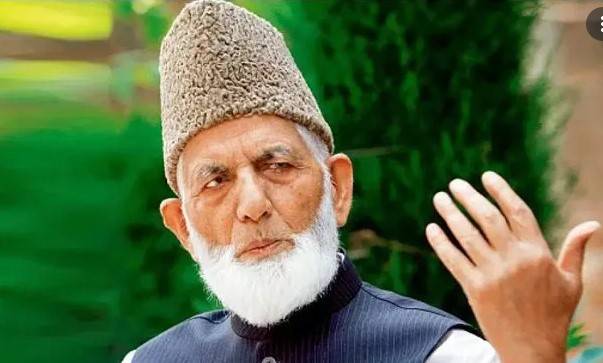Syed Ali Shah Geelani laid to rest in night-time funeral in Srinagar
Indian government rejects veteran Kashmiri leader’s wish to be buried in martyrs graveyard

Stay tuned with 24 News HD Android App

Senior-most Kashmiri leader and an icon of freedom struggle Syed Ali Shah Geelani was buried in the wee hours of Thursday in local graveyard in Hyderpora area of Srinagar district.
Ali Geelani’s burial was held in a tightly controlled pre-dawn ceremony as Indian authorities imposed a lockdown across Occupied Kashmir.
The burial of Ali Geelani was completed by 4:45 am on Thursday in presence of his relatives and neighbours in Hyderpora graveyard.
The 92- year-old veteran Kashmiri leader passed away at his residence in Hyderpora on Wednesday at 10:35 pm.
The uncompromising campaigner against Indian rule in Kashmir died following a long illness, and thousands of police personnel were deployed soon after to try and prevent unrest in the disputed territory.
Geelani was buried at 4:30 am Thursday at a cemetery near his home in the main city of Srinagar. Only a small number of his relatives were present, including two of his sons, a source told AFP.

People carry an empty coffin as they walk towards the residence of Kashmiri veteran leader Syed Ali Shah Geelani after his death at the age of 92 in Srinagar.–AFP
Geelani, the most outspoken critic of India who spent several years in jail or under house arrest, had wanted to be buried at the Martyrs Cemetery in Srinagar. But authorities rejected that request.
“We basically took control of the arrangements,” the unnamed Indian official said.
Residents said authorities acted out of fear of mass mourning turning into unrest. “Troops are everywhere, there are barbed wire blockades on every main road,” said one.
See Also: Pakistan observes mourning day as leaders pay tribute to Geelani
After the death became known, announcements were made from loudspeakers of the main mosque near Geelani’s residence asking people to march towards the house.
But police said no one in the Kashmir Valley would be allowed to leave their homes.
Even journalists were prevented from covering the funeral and stopped from going to Hyderpora while restrictions were imposed across Kashmir and the internet and mobile phones were snapped. Only post-paid mobiles of Bharat Sanchar Nigam Limited were working in Occupied Kashmir.

Security forces were deployed across Kashmir and all the roads leading towards Hyderpora were sealed. Officials said additional troops have been deployed especially in Srinagar’s old city and North Kashmir. Vehicles were stopped at several places and prevented from moving to Srinagar or other major towns.
Geelani had been ill for several months with heart and kidney problems.
Geelani had been a thorn in India’s side since the early 1960s when he began campaigning for the territory’s merger with Pakistan. He also pursued his calls as a member of the Kashmir assembly.
The veteran politician was jailed for nearly 10 years after 1962 and was often restricted to his home after that.
See Also: Syed Ali Geelani: A life dedicated to Kashmir and Kashmiris
Since his youth, Geelani had been a member of Jamaat-i-Islami, the largest political-religious organisation in Indian-held Kashmir that was banned by India’s Hindu nationalist government in 2019.
He rejected any notion of direct talks with the New Delhi government unless it formally “accepts Kashmir as a disputed territory” and stopped describing the region as an “integral part of India”.
Indian governments of all political colours have insisted on sovereignty over Kashmir.
Geelani was also a staunch critic of the sporadic but failed attempts at dialogue between India and Pakistan — nuclear-armed rivals that fought two of their three wars since independence over Kashmir and came close to a fourth one in 2016.
India has been struggling to bring normal life back to Kashmir after it cancelled the region’s semi-autonomous status and divided it into two centrally controlled territories in August 2019.
A security clampdown imposed at the time saw mobile internet services cut for more than a year. Scores of political leaders were detained and many are still not free.
Prime Minister Narendra Modi said the move was intended to bring peace and prosperity to Kashmir.
